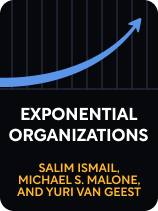

This article is an excerpt from the Shortform book guide to "Exponential Organizations" by Salim Ismail, Michael S. Malone, and Yuri van Geest. Shortform has the world's best summaries and analyses of books you should be reading.
Like this article? Sign up for a free trial here.
How do IT (information technology) companies make money? How do they use technology and data to earn a profit?
According to Salim Ismail, there’s no limit to how large information technology companies can grow and how much revenue they can make. This is because they make their money by taking advantage of information, a resource that has no limit.
Read on to learn more about how IT companies make money by using technology and data.
The Rise of Information Technology
Exponential Organizations author Salim Ismail claims that a successful information technology (IT) company will follow Moore’s Law: a rule of thumb that computing power doubles every 18 to 24 months, while prices stay stable. This is because these companies rely on information technology, which improves exponentially over time. People use technology to create new technology more quickly; then, that better technology allows them to create even more effective technology even more quickly; and so on. But how do IT companies make money using this technology and data, specifically?
Ismail calls information-based companies “exponential organizations” or “rapid-growth companies.” One crucial reason why rapid-growth companies outperform traditional companies is that they take full advantage of the information that modern technology makes available.
Rapid-growth companies are, in simple terms, companies that experience fast and ever-accelerating revenue growth. Whereas a traditional company might consider 5% annual growth a good benchmark for success, Ismail claims that these rapid-growth companies could double their revenue every one or two years. This is possible because rapid-growth companies are designed to take full advantage of advancements in technology and business theory. Ismail describes companies that are small, efficient, and flexible—such organizations, like IT companies, easily adapt to change and can quickly adjust their practices for maximum customer satisfaction and profit.
How IT Companies Make Money
In Exponential Organizations, Ismail explains how IT companies make money, claiming that companies that rely on information technology could potentially double their revenues every 18 to 24 months because all information technology—not just computers—follows the pattern set down in Moore’s Law. In other words, as technology becomes more effective at gathering and communicating information, companies that rely on that information will become more and more profitable.
(Shortform note: As a counterpoint to Ismail, Moore’s Law may not hold up much longer. Some experts predict that, sometime in the 2020s, physical limitations will put an end to the exponential growth of computing power. In fact, the CEO of tech company Nvidia says it’s already happened; that from now on, increased processing power is going to come with increased prices. It’s possible that other kinds of information technology will encounter similar limitations.)
Ismail says that information is a rapid-growth company’s most important asset, and there’s more of it available than ever. There are billions of different sensors around the world right now, tracking everything from where people go, (GPS) to what they’re interested in (web traffic), and even their exercise and sleep routines (biometrics). Perhaps most importantly—in spite of very valid concerns about their privacy—people produce a lot of this data willingly by using everything from smartphones to drones to wearable tech.
However, this is only the beginning. Ismail says that information technology is based on the idea that everything in the world can be observed and measured; and that soon, almost every aspect of every person’s life will be observed and measured. Many people find this idea disturbing because it carries the risk of serious invasions of privacy, but Ismail believes that it’s inevitable.
Entrepreneurs looking to create IT companies will then use that information to make money in one of two ways. Some will create entirely new businesses based on that information—for example, someone might design an app that makes grocery recommendations based on your biometrics, genetics, and income. Others will use new information to bolster existing companies, like if a grocery store used that same information to perfectly tailor its products to the people in its area.
| Potential Benefits Versus Risks of Information Technology Ismail briefly mentions how improved surveillance and data collection technology is impacting our privacy and may continue to do so in the future, but he quickly moves past the topic—he says that we’ve already lost a great deal of our privacy, and the trend will inevitably continue, so we might as well take advantage of it with rapid-growth companies. While Ismail is rather resigned to the idea of data collection, some experts actively support it. For example, in Lifespan, David Sinclair discusses how biometric technology and genetic mapping are providing companies with extremely personal data, but at the same time are helping doctors to create personalized health plans and manage their patients’ health risks. Sinclair believes that the benefits of data harvesting are well worth the relatively small risk of having your data fall into the wrong hands. Others argue that these invasions of privacy will lead to other civil liberties being trampled—for example, by allowing police to easily track down protestors, or by punishing people for what they say in the privacy of their own homes. These people warn of the dangers of a surveillance state: a dystopia like the one found in George Orwell’s 1984, where the government watches every person every moment of the day, looking for any signs of rebellious acts or “dangerous” thoughts. Ultimately, how closely we can be monitored—and what companies or government bodies can do with our data—is a complex issue that must be addressed by lawmakers and public discourse. |
How to Profit From Data
In Exponential Organizations, Ismail mostly talks about using data to boost sales and minimize costs, but there are many other ways that information can earn money for a company. For example, you could sell the data directly; many companies will pay good money for market insights and customer information. (This is generally how free services like Facebook and Twitter make their money.)
Having data also increases the monetary value of a company. For instance, Facebook paid $21.8 billion to buy WhatsApp in 2014, which was many times what the app itself was worth. However, the real value was in the customer data that Facebook got access to with the purchase—data that it could use to improve the reach and engagement of the Facebook app.

———End of Preview———
Like what you just read? Read the rest of the world's best book summary and analysis of Salim Ismail, Michael S. Malone, and Yuri van Geest's "Exponential Organizations" at Shortform.
Here's what you'll find in our full Exponential Organizations summary:
- How to leverage new technology and business practices to build a successful company
- How to minimize your personal risks when starting a company
- The importance of connection and community to boost success






